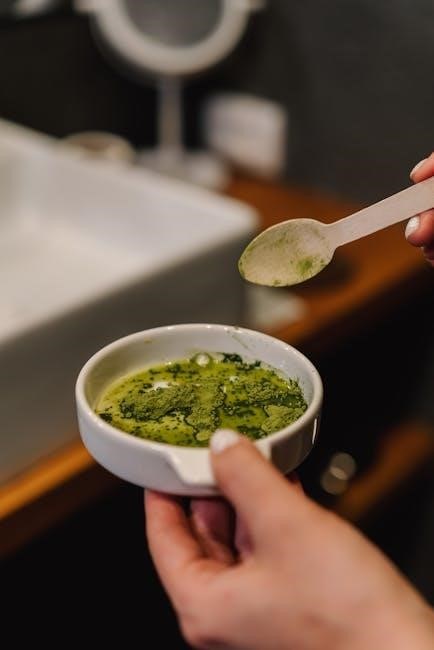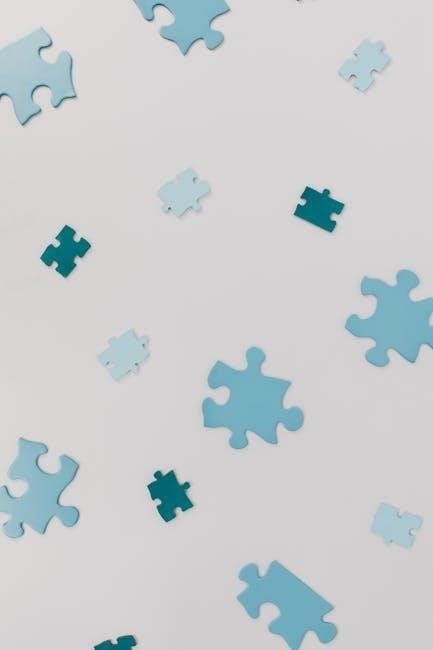
odyssey of the mind spontaneous problems pdf
Spontaneous problems are a key component of Odyssey of the Mind, offering verbal, hands-on, or combination challenges. They test quick thinking and creativity under pressure, fostering problem-solving skills essential for success.

Understanding Spontaneous Problems in Odyssey of the Mind
Spontaneous problems in Odyssey of the Mind are categorized into Verbal, Hands-On, and Combination types, each requiring quick thinking and creativity. They remain top secret until competition day, requiring practice and adaptability.
Definition and Purpose of Spontaneous Problems
Spontaneous problems in Odyssey of the Mind are unplanned, on-the-spot challenges designed to assess creative thinking, quick decision-making, and teamwork. These problems are categorized into Verbal, Hands-On, and Combination types, each requiring unique approaches. The purpose of these problems is to evaluate how well teams can think critically under pressure, fostering adaptability and innovation. They are kept confidential until the competition to ensure fairness and to test raw, unprepared responses. By participating, students develop essential life skills, including problem-solving, communication, and collaboration, while learning to embrace challenges with confidence and creativity. These exercises are a cornerstone of the Odyssey of the Mind program.
Types of Spontaneous Problems: Verbal, Hands-On, and Combination
Spontaneous problems in Odyssey of the Mind are categorized into three distinct types: Verbal, Hands-On, and Combination. Verbal problems require creative thinking and quick responses, often involving wordplay, riddles, or imaginative scenarios. Hands-On problems challenge teams to build, create, or solve physical tasks using everyday materials. Combination problems blend both verbal and hands-on elements, demanding a mix of creativity and practical skills. Each type is designed to test different aspects of problem-solving, ensuring teams are well-rounded and adaptable. These challenges prepare participants to think critically and act decisively, fostering innovation and teamwork. The variety of problem types ensures a comprehensive test of skills, making the competition dynamic and engaging for all participants.

Examples of Spontaneous Problems
Examples include naming uses for a jack-o-lantern after Halloween or identifying opposites. Teams might also compare unlikely objects, fostering creative and quick thinking under pressure.
Verbal Spontaneous Problems
Verbal spontaneous problems require teams to think creatively and articulate their ideas quickly. Examples include naming uses for a jack-o-lantern after Halloween or identifying opposites. Teams might also compare unlikely objects, such as how a cloud and a spoon are alike. These problems test quick thinking, humor, and the ability to generate unique responses under time pressure. For instance, a response might humorously suggest making an “OM-lette” with eggs. Such challenges foster creativity and teamwork, preparing students to articulate their thoughts clearly and confidently in high-pressure situations. Verbal problems are a cornerstone of Odyssey of the Mind, emphasizing mental agility and innovative thinking.
Hands-On Spontaneous Problems
Hands-on spontaneous problems challenge teams to create tangible solutions using everyday materials. Examples include building a bridge with limited supplies or designing a structure to hold weight. Teams must think creatively and work quickly, often under time constraints; These problems test engineering skills, teamwork, and the ability to adapt. For instance, teams might use balsa wood, popsicle sticks, or other materials to construct a solution. The hands-on nature of these challenges encourages practical problem-solving and innovation. Teams must also explain their creations, blending creativity with technical skills. These problems are top secret, ensuring fairness, and they foster quick thinking and resourcefulness, essential for real-world applications and competitions.
Verbal/Hands-On Combination Problems
Verbal/hands-on combination problems require teams to deliver both creative verbal responses and construct physical solutions. For example, teams might build a structure using limited materials and explain its theme or function. These problems test adaptability, as they often involve unexpected challenges. Teams must collaborate seamlessly, blending verbal creativity with hands-on skills. For instance, they might create a miniature amusement park and describe its attractions or design a weather forecasting tool while explaining its mechanism. These problems are top secret and demand quick thinking, ensuring teams are well-prepared for the unexpected. They foster innovation, teamwork, and the ability to think on their feet, making them a dynamic part of the competition.

Preparing for Spontaneous Problems
Teams should practice diverse problem types, improve brainstorming techniques, and enhance quick thinking. Regular practice builds confidence and adaptability, ensuring they excel in verbal, hands-on, or combination challenges.
Practice Strategies for Teams
Effective preparation involves regular brainstorming sessions, timed exercises, and reviewing past problems. Teams should practice verbal, hands-on, and combination challenges to build adaptability. Incorporate games and activities that simulate competition pressure, encouraging quick thinking and creativity. Assign roles to improve communication and decision-making under time constraints. Encourage team members to think outside the box and explore unconventional solutions. Regular practice helps refine problem-solving skills and fosters teamwork, ensuring they are well-prepared for any spontaneous challenge. By mastering these strategies, teams can approach competitions with confidence and creativity, ready to excel in Odyssey of the Mind spontaneous problems.
Key Skills Required for Success
Success in spontaneous problems demands a combination of essential skills. Teams must exhibit quick thinking, creativity, and effective communication to tackle challenges under pressure. Problem-solving abilities, adaptability, and resourcefulness are crucial for devising innovative solutions. Time management is critical, as teams must complete tasks efficiently within strict time limits. Emotional resilience and teamwork are equally important, as collaboration and staying calm under stress lead to better outcomes. Creative thinking and humor often set apart exceptional responses. Mastery of these skills ensures teams can navigate the unpredictable nature of spontaneous problems with confidence and ingenuity, making them invaluable for Odyssey of the Mind competitions.
Benefits of Participating in Spontaneous Problems
Participating in spontaneous problems fosters creative thinking, enhances problem-solving skills, and builds adaptability. It encourages teamwork, quick decision-making, and confidence, preparing students for real-world challenges.
Development of Creative Thinking
Spontaneous problems in Odyssey of the Mind are designed to nurture creative thinking by challenging students to generate innovative solutions under time constraints. These problems encourage students to think outside the box, exploring unconventional ideas and connections. For example, tasks like naming uses for a jack-o-lantern after Halloween or imagining objects in a field (e.g., a cube, ladder, or horse) prompt students to brainstorm unique and humorous responses. Such exercises enhance their ability to envision multiple perspectives and solutions, fostering adaptability and innovation. Over time, this practice hones their creative thinking skills, preparing them to approach real-world challenges with confidence and originality.
Improvement of Problem-Solving Skills
Engaging in spontaneous problems significantly enhances problem-solving abilities by challenging students to think critically and act decisively under pressure. These exercises require quick analysis of situations, identification of key issues, and the creation of practical solutions. For instance, tasks like naming opposites or explaining how unrelated objects are similar force students to think creatively and logically. Over time, participants develop a stronger capacity to break down complex problems into manageable parts, prioritize ideas, and implement effective strategies. This skill improvement not only benefits their performance in competitions but also equips them to tackle real-world challenges with confidence and efficiency.

Resources for Spontaneous Problem Preparation
Official Odyssey of the Mind guidelines and online practice materials provide teams with structured exercises and examples to refine their spontaneous problem-solving skills effectively.
Official Odyssey of the Mind Guidelines
The official guidelines provide detailed rules and expectations for spontaneous problems, ensuring fairness and consistency. They outline the types of challenges—verbal, hands-on, or combination—and emphasize secrecy to maintain fairness. Teams must adhere to these rules during competitions, and the guidelines help coaches and participants understand judging criteria. The documents also include examples of past problems, such as naming uses for a jack-o-lantern or identifying opposites, to illustrate the creative thinking required. Additionally, the guidelines stress the importance of the 80/20 rule, ensuring minimal external assistance. By following these guidelines, teams can better prepare for the spontaneity and innovation expected in competitions.
Online Practice Materials and Examples
Online resources offer a wealth of practice materials, including past spontaneous problems and example solutions. Websites provide verbal, hands-on, and combination challenges, such as naming uses for a jack-o-lantern or creating humorous responses. These materials help teams prepare by simulating competition scenarios. Practice packets, like those for AP chemistry, also include exercises on entropy and free energy, fostering critical thinking. Additionally, online forums and guides share tips for solving problems creatively, ensuring teams are well-equipped for spontaneous rounds. Regular practice with these materials enhances quick thinking and teamwork, essential for success in Odyssey of the Mind competitions.
Related posts:
Archives
Calendar
| M | T | W | T | F | S | S |
|---|---|---|---|---|---|---|
| 1 | 2 | 3 | 4 | 5 | 6 | |
| 7 | 8 | 9 | 10 | 11 | 12 | 13 |
| 14 | 15 | 16 | 17 | 18 | 19 | 20 |
| 21 | 22 | 23 | 24 | 25 | 26 | 27 |
| 28 | 29 | 30 | 31 | |||
Leave a Reply
You must be logged in to post a comment.